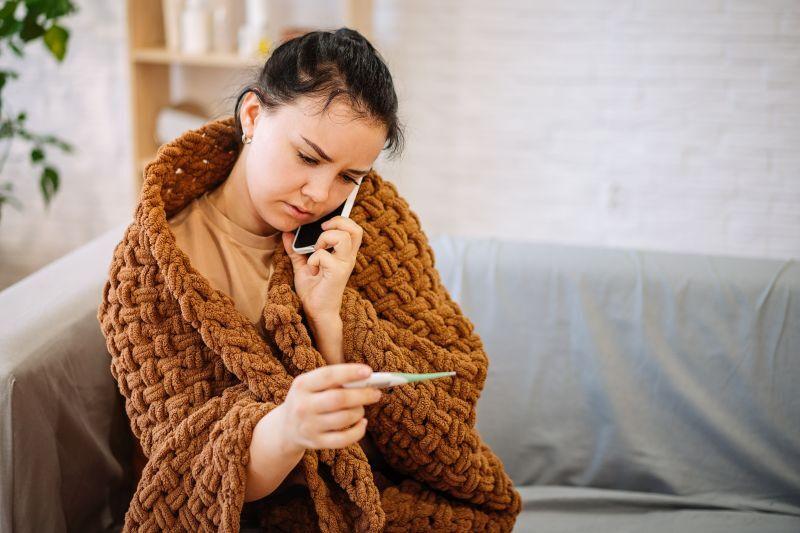This page has been automatically translated. Please refer to the page in French if needed.
Covid Recommendations
Covid-19: What to do if you are positive or case contact?
Publié le 05 octobre 2023 - Legal and Administrative Information Directorate (Prime Minister)
While the new recall campaign was brought forward to 2 October due to a surge in COVID-19 cases, the Health Insurance Service recalls good practices in terms of barrier gestures, isolation, work stoppages and use of tests. Service-Public.fr take stock for you.

When to test?
Are you experiencing symptoms suggestive of COVID-19? It is recommended that you have an antigen test or a RT-PCR test and contact your treating physician if the test is positive.
It is also important to tell everyone you have been with:
- people who are close to each other within 48 hours before symptoms begin;
- or within 7 days of a positive test if no symptoms are present.
Reminder
since 1er March 2023, the way in which screening tests (antigenic, PCR and serological) are supported changed: Service-Public.fr Covid-19: What care rules? informs you.
Isolation and barrier gestures
Since 1er february 2023, systematic isolation for those who tested positive is no longer mandatory and Health Insurance no longer contacts people who have tested positive or their cases contacted under the tracing contact.
As with any acute respiratory infection disease, however, it is strongly recommended that people who test positive self-isolate and avoid contact with the frail; and people who have been exposed to a contagious person.
Compliance with the barrier gestures :
- regularly washing hands or using an aqueous-alcoholic solution;
- coughing or sneezing into his elbow or a disposable tissue;
- blow your nose in a disposable tissue and then throw it away;
- avoid touching the face;
- maintain a distance of at least 2 meters from others;
- wave without shaking hands and stop kissing;
- Wear a maximum protective mask (surgical mask or FFP2 mask)
- Minimize contacts.
- ventilate each room as often as possible, at least 10 minutes every hour.
Find the general health recommendations Ministry of Health in the fight against winter respiratory diseases and COVID-19.
And sIn the workplace?
The health protocol in company ended in March 2022. Masks and social distancing are no longer required; hygiene practices such as hand washing, surface cleaning and ventilation are still recommended.
Teleworking is no longer mandatory but is still recommended.
One Covid-19 risk prevention measures guide Guide to COVID-19 risk prevention measuresreplaces the national protocol in company.
Work stoppage
In case of a positive test, and if your health condition does not allow you to work (including working remotely), you should call your doctor for an in-person consultation or teleconsultation. He or she may prescribe a work stoppage if necessary. The practitioner assesses the importance of your symptoms and can monitor your condition.
Reminder
since 1er in february 2023, the system of derogating compensation for work stoppages (without waiting period) no longer exists. Only your doctor can prescribe a work stoppage to be transmitted according to the usual rules to your employer.
Please note
persons who have contracted Covid-19 in the course of their professional activity may benefit from specific recognition as an occupational disease: for more information.
What treatment?
If you are an adult and are at high risk of developing severe disease, your doctor may prescribe you oral antiviral treatment from a pharmacy. This treatment should start before 5e symptom day. It can be offered even if you have been vaccinated against COVID-19.
Please note
to monitor your health, you are advised to take your temperature twice a day.
The treating physician should be contacted if the symptoms develop, if any of the symptoms are unusual, if there is any doubt about treatment, or if there are any other medical conditions. If breathing is difficult, the doctor should be called immediately 15 (or the 114 for people who are deaf or hard of hearing).
What to do if you come into contact with someone with COVID-19?
To protect yourself and others, if you have been with someone who is sick, it is recommended to follow certain health instructions in order to break the chains of transmission of the disease:
- comply with barrier measures;
- wear a mask;
- avoid contact with the frail and at-risk;
- do antigen or PCR testing if symptoms develop.
If your test is negative, it is recommended that you monitor for symptoms and perform a test if necessary. If the contact person is a child under 12 years of age, the instructions to be followed are identical to those of adults.
Reminder
Law No. 2022-1089 of 30 July 2022 ended emergency regimes to address the COVID-19 outbreak. In particular, it provides for the discontinuation of the processing of personal data derived from the screening information system (SI-DEP) based on the results of PCR and antigen tests.
Additional topics
Service-Public.fr
Service-Public.fr
Service-Public.fr
Service-Public.fr
National Health Insurance Fund (Cnam)
National Health Insurance Fund (Cnam)
National Health Insurance Fund (Cnam)
Ministry of Health
Agenda
Apprentissage
Jusqu'au 17 mai 2024
Publié le 03 mai 2024
Impôts
À partir du 11 avr. 2024
Publié le 11 avril 2024
Prévention Covid-19
À partir du 15 avr. 2024
Publié le 18 mars 2024
Calendrier scolaire
Du 6 avr. au 12 mai 2024
Publié le 15 mars 2024

